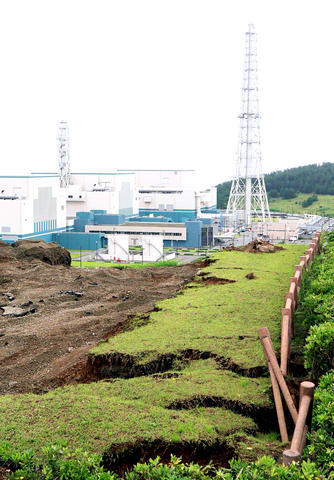Monday's powerful earthquake tipped over barrels of nuclear waste at a power plant and officials yesterday were investigating whether there were any radioactive leaks, a day after they said the quake spilled radioactive water into the sea.
The death toll stood at nine a day after Monday's 6.6-magnitude quake.
One person was missing and 13,000 quake victims were crowding emergency shelters as rescue workers rushed to locate survivors amid new fears of landslides.

PHOTO: EPA
While the quake had triggered a leak of water with radioactive material on Monday at the world's largest nuclear power plant, officials said it caused no harm to the environment.
Yesterday, however, officials were investigating a possible second leak at the Kashiwazaki- Kariwa plant, saying about 100 drums containing low-level nuclear waste fell during the quake and were found yesterday.
Some of the barrels' lids were open, said Masahide Ichikawa, an official with the Niigata Prefecture government.
A spokesman at Tokyo Electric Power Co said it was still trying to determine whether any hazardous material had spilled but said there was no effect outside the plant.
Another leak at the Kashiwazaki plant would sow further doubts about the safety of Japan's nuclear power plants, which have suffered a string of accidents and cover-ups amid deep concerns they are vulnerable in earthquakes.
"Whenever there is an earthquake, the first thing we worry about is the nuclear plant. I worry about whether there will be a fire or something. We have no information, it's really frightening," said Kiyokazu Tsunajima, who spent the first night sleeping in his car, afraid an aftershock might cause his damaged house to collapse.
The quake triggered a small fire at an electrical transformer in the plant. But it was announced only 12 hours later that the temblor also caused a leak of water containing radioactive material.
Plant officials said the water leak was harmless and well within safety standards, but the delay in notifying the public spurred concern among anti-nuclear activists and triggered criticism from top government officials.
"They raised the alert too late. I have sent stern instructions that such alerts must be raised seriously and swiftly," Japanese Prime Minister Shinzo Abe told reporters in Tokyo. "Those involved should repent their actions."
Economy, Trade and Industry Minister Akira Amari said the plant must not resume operations until a thorough safety check has been conducted.
Later yesterday, Tokyo Electric said a small amount of radioactive materials cobalt-60 and chromium-51 had been emitted into the atmosphere from an exhaust stack, but posed no danger to the environment. It was unclear if that leak was caused by the quake.
Elsewhere in Kashiwazaki, refugees packed school gymnasiums and community centers. While many said their homes were intact, they still sought shelter because water and electricity had yet to be restored.
Also see stories:

People can preregister to receive their NT$10,000 (US$325) cash distributed from the central government on Nov. 5 after President William Lai (賴清德) yesterday signed the Special Budget for Strengthening Economic, Social and National Security Resilience, the Executive Yuan told a news conference last night. The special budget, passed by the Legislative Yuan on Friday last week with a cash handout budget of NT$236 billion, was officially submitted to the Executive Yuan and the Presidential Office yesterday afternoon. People can register through the official Web site at https://10000.gov.tw to have the funds deposited into their bank accounts, withdraw the funds at automated teller

PEACE AND STABILITY: Maintaining the cross-strait ‘status quo’ has long been the government’s position, the Ministry of Foreign Affairs said Taiwan is committed to maintaining the cross-strait “status quo” and seeks no escalation of tensions, the Ministry of Foreign Affairs (MOFA) said yesterday, rebutting a Time magazine opinion piece that described President William Lai (賴清德) as a “reckless leader.” The article, titled “The US Must Beware of Taiwan’s Reckless Leader,” was written by Lyle Goldstein, director of the Asia Program at the Washington-based Defense Priorities think tank. Goldstein wrote that Taiwan is “the world’s most dangerous flashpoint” amid ongoing conflicts in the Middle East and Russia’s invasion of Ukraine. He said that the situation in the Taiwan Strait has become less stable

CONCESSION: A Shin Kong official said that the firm was ‘willing to contribute’ to the nation, as the move would enable Nvidia Crop to build its headquarters in Taiwan Shin Kong Life Insurance Co (新光人壽) yesterday said it would relinquish land-use rights, or known as surface rights, for two plots in Taipei’s Beitou District (北投), paving the way for Nvidia Corp to expand its office footprint in Taiwan. The insurer said it made the decision “in the interest of the nation’s greater good” and would not seek compensation from taxpayers for potential future losses, calling the move a gesture to resolve a months-long impasse among the insurer, the Taipei City Government and the US chip giant. “The decision was made on the condition that the Taipei City Government reimburses the related

FRESH LOOK: A committee would gather expert and public input on the themes and visual motifs that would appear on the notes, the central bank governor said The central bank has launched a comprehensive redesign of New Taiwan dollar banknotes to enhance anti-counterfeiting measures, improve accessibility and align the bills with global sustainability standards, Governor Yang Chin-long (楊金龍) told a meeting of the legislature’s Finance Committee yesterday. The overhaul would affect all five denominations — NT$100, NT$200, NT$500, NT$1,000 and NT$2,000 notes — but not coins, Yang said. It would be the first major update to the banknotes in 24 years, as the current series, introduced in 2001, has remained in circulation amid rapid advances in printing technology and security standards. “Updating the notes is essential to safeguard the integrity